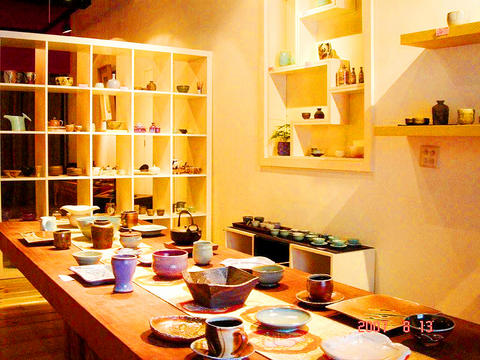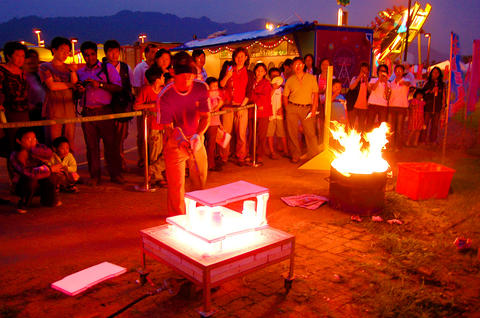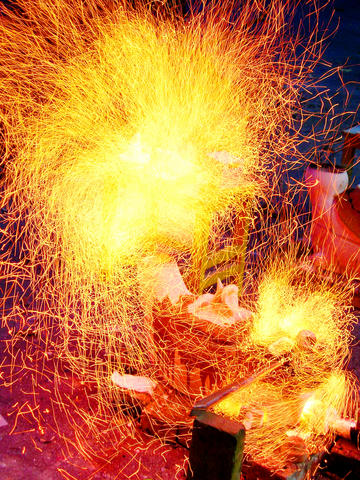The annual Yingge International Ceramics Festival (鶯歌國際陶瓷嘉年華) is a major part of the Yingge Ceramics Museum's (鶯歌陶瓷博物館) effort to win international recognition for producing high quality ceramics, particularly as a rival of China's Porcelain Capital, Jingde Zhen (景德鎮). The town prides itself on being an innovator in the field of ceramics, pushing the boundaries in concept and design, as well as production technology.
The festival, which starts today and runs until Oct. 14, has many objectives; not least of which is showing how much fun ceramics can be. This year's theme is the four elements - wind, earth, water and fire - which are vital to ceramic production, as well as symbols for environmental issues and Taoist alchemy and cosmology.
The Taoist element provides the basis for the highlight of the event: the welcoming of the God of the Kiln. This will happen through a parade along the streets of Yingge tomorrow (1:30pm to 3pm) and will be repeated again next Saturday (2:30pm to 3:30pm).

Photos: courtesy of the Yingge International Ceramics Festival
Activities take place around the museum, the ceramics park (陶瓷公園) and Shalun Plaza (砂輪廣場). There will be demonstrations of the potter's art throughout the festival, as well as opportunities for children to try their hand at pottery, mosaic-building and more.
Aside from the fun and games, the festival serves as an important forum for international ceramic artists. This year, French artist Jacque Kaufmann and American Doug Casebeer will be guests of the festival, and will work alongside local artists Chu Fang-yi (朱芳毅) and Hsu Chia-yu (許家瑜), both winners at the Fifth Taipei Ceramic Design Awards (第五屆台北陶藝創作獎). There will be a chance to watch these masters at work during the festival.
Two special exhibitions will be held in conjunction with the festival. The first, When Water Meets Ceramics (人間清歡:當水遇見陶特展), is an exploration of the close relationship of water to ceramics. No exhibition relating to water and pottery would be complete without some consideration of the role of tea preparation and consumption through the ages, and the museum will host five one-hour sessions with tea master Tsai Chung-nan (蔡忠南) on this subject.

A Selected Exhibition of New Ceramics Works (陶瓷新品評鑑展), an exhibition of work by 52 artists representing 34 manufacturers, is another opportunity to the view work of emerging artists.
The whole town of Yingge will be turning out for the festival, making this the perfect time to visit, even for those without a specific interest in ceramics. Workshops around town will be displaying their newest and best in anticipation of the inflow of tourists. There will be plenty happening to keep the kids interested, and if you want to get your hands dirty, there will be DIY activities to give you the full experience of being in Taiwan's very own porcelain capital.


June 2 to June 8 Taiwan’s woodcutters believe that if they see even one speck of red in their cooked rice, no matter how small, an accident is going to happen. Peng Chin-tian (彭錦田) swears that this has proven to be true at every stop during his decades-long career in the logging industry. Along with mining, timber harvesting was once considered the most dangerous profession in Taiwan. Not only were mishaps common during all stages of processing, it was difficult to transport the injured to get medical treatment. Many died during the arduous journey. Peng recounts some of his accidents in

“Why does Taiwan identity decline?”a group of researchers lead by University of Nevada political scientist Austin Wang (王宏恩) asked in a recent paper. After all, it is not difficult to explain the rise in Taiwanese identity after the early 1990s. But no model predicted its decline during the 2016-2018 period, they say. After testing various alternative explanations, Wang et al argue that the fall-off in Taiwanese identity during that period is related to voter hedging based on the performance of the Democratic Progressive Party (DPP). Since the DPP is perceived as the guardian of Taiwan identity, when it performs well,

A short walk beneath the dense Amazon canopy, the forest abruptly opens up. Fallen logs are rotting, the trees grow sparser and the temperature rises in places sunlight hits the ground. This is what 24 years of severe drought looks like in the world’s largest rainforest. But this patch of degraded forest, about the size of a soccer field, is a scientific experiment. Launched in 2000 by Brazilian and British scientists, Esecaflor — short for “Forest Drought Study Project” in Portuguese — set out to simulate a future in which the changing climate could deplete the Amazon of rainfall. It is

The Taiwan People’s Party (TPP) on May 18 held a rally in Taichung to mark the anniversary of President William Lai’s (賴清德) inauguration on May 20. The title of the rally could be loosely translated to “May 18 recall fraudulent goods” (518退貨ㄌㄨㄚˋ!). Unlike in English, where the terms are the same, “recall” (退貨) in this context refers to product recalls due to damaged, defective or fraudulent merchandise, not the political recalls (罷免) currently dominating the headlines. I attended the rally to determine if the impression was correct that the TPP under party Chairman Huang Kuo-Chang (黃國昌) had little of a